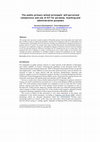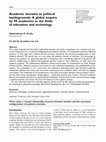Papers by Kyriacos Charalambous

The current study surveyed a random sample of 250 public primary school principals, from April un... more The current study surveyed a random sample of 250 public primary school principals, from April until June of 2008, in order to explore the principals' self perceived competence and use of Information and Communication Technologies (ICT) for personal, teaching and administrative-managerial purposes in primary schools of Cyprus. The results of the study revealed that primary school principals generally, do not feel very competent in using ICT, although the majority of them have received in-service training on ICT for personal purposes. Moreover, principals use ICT frequently but not on a daily basis. Also, principals feel more competent in using a word-processor and a search engine on the Internet than creating and using a spreadsheet or a database. Finally, it appears that principals use the computer more frequently for personal purposes, then for administrative purposes and last for teaching purposes.
Learning, Media and Technology, 2008
... The e‐strategy Harnessing technology: Transforming learning and children's services ww... more ... The e‐strategy Harnessing technology: Transforming learning and children's services www.dfes.gov.uk/publications/e‐strategy (accessed March 15, 2006) View all references) in March 2005 is the provision of an integrated online personal support for children and learners. ...
Journal of Education For Teaching, Jan 22, 2007
Journal of Information Technology Education, 2011
Research on e-Learning and ICT in Education, 2011

Technology, Pedagogy and Education, 2002
In-service education and training (INSET) is considered a crucial issue for the implementation an... more In-service education and training (INSET) is considered a crucial issue for the implementation and institutionalisation of new information and communication technologies (ICT) in educational systems worldwide. A pilot programme for ICT implementation has been running since 1994 in a number of Cypriot primary schools. The provision of INSET in relation to this particular programme appears problematic. Therefore, two studies were independently conducted in 1996 and 1998 to highlight teachers' training background and needs. The second study also aimed to investigate the content and form of ICT INSET provision in terms of the categories of professional development identified by McDougall & Squires (1997). Both studies indicate that the majority of teachers are shown to lack an ICT training background while the approach to training appears piecemeal, focused mostly on off-site training and oriented towards the acquisition of basic computer skills. However, teachers report that they ...
Journal of Education for Teaching: International Research and Pedagogy, 2006
Education and Information Technologies, 2000
In Cyprus, the pilot programme for the introduction of Information and Communication Technology (... more In Cyprus, the pilot programme for the introduction of Information and Communication Technology (ICT) in elementary schools aimed at ICT as a cross-curricular tool and involved a combination of centralised initiative and largely decentralised implementation responsibility. Two independent studies on curricula integration indicated that parents' and teachers' preferred models as well as teachers' applied models vary widely. These models range from the technocentric (applying ICT as a discrete subject) to the humanistic curriculum (using ICT as a crosscurricular tool). The findings indicate that the challenge is on the policy makers to decide which model to adopt so as to specify the role of ICT in the National Curriculum and to create an appropriate infrastructure to support the model adopted.
British Journal of Educational Technology, 2005

by S. Sadi SEFEROGLU, Salih BARDAKCI, Deniz Erguvan, Khamsum Kinley, S.Sadi SEFEROGLU(2), Uyanga Sambuu, Martin Ebner, Nafisat Afolake Adedokun-Shittu, Antoanela Naaji, Sue Gregory, Mohammed Ali Akour, Mahbub ahsan khan, Ijaz A. Qureshi, Hanadi Buarki, Elaine Khoo, R. Bottino, Alev Elci, Sarah Thomas, António Moreira, Kyriacos Charalambous, Jamil Itmazi, Rita Birziņa, Paul Nleya, Ümit YAPICI, Camilius Sanga, and Antoanela Luciana Naaji Al Lily, A., Seferoglu, S. S., Foland, J., Stoloff, D., Gogus, A., Erguvan, I., Awshar, M., Tonde... more Al Lily, A., Seferoglu, S. S., Foland, J., Stoloff, D., Gogus, A., Erguvan, I., Awshar, M., Tondeur, J., Hammond, M., Venter, I., Jerry, P., Vlachopoulos, D., Oni, A., Liu, Y., Badosek, R., López de la Madrid, M., Mazzoni, E., Lee, H., Kinley, K., Kalz, M., Sambuu, U., Bushnaq, T., Pinkwart, N., Adedokun-Shittu, N., Zander, P., Oliver, K., Pombo, L., Sali, J., Gregory, S., Tobgay, S., Joy, M., Elen, J., Jwaifell, M., Said, M., Al-Saggaf, Y., Naaji, A., White, J., Jordan, K., Gerstein, J., Yapici, İ., Sanga, C., Nleya, P., Sbihi, B., Lucas, M., Mbarika, V., Reiners, T., Schön, S., Sujo-Montes, L., Santally, M., Häkkinen, P., Al Saif, A., Gegenfurtner, A., Schatz, S., Vigil, V., Tannahill, C., Partida, S., Zhang, Z., Charalambous, K., Moreira, A., Coto, M., Laxman, K., Farley, H., Gumbo, M., Simsek, A., Ramganesh, E., Birzina, R., Player-Koro, C., Dumbraveanu, R., Ziphorah, M., Mohamudally, N., Thomas, S., Romero, M., Nirmala, M., Cifuentes, L., Osaily, R., Omoogun, A., Elçi, A., Edyburn, D., Moudgalya, K., Ebner, M., Bottino , R., Khoo, E., Pedro, L., Buarki, H., Román-Odio, C., Qureshi, I., Khan, M., Thornthwaite, C., Kerimkulova, S., Downes, T., Malmi, L., Bardakci, S., Itmazi, J., Rogers, J., Rughooputh, S., Akour, M., Henderson, J., de Freitas, S., & Schrader, P. (2016). Academic domains as political battlegrounds: A global enquiry by 99 academics in the fields of education and technology. Information Development. doi:10.1177/0266666916646415.
http://idv.sagepub.com/content/early/2016/05/03/0266666916646415.full.pdf?ijkey=QtsF7QaLOhMzxrt&keytype=finite
https://www.academia.edu/25056969/Academic_domains_as_political_battlegrounds_A_global_enquiry_by_99_academics_in_the_fields_of_education_and_technology
---------------------------------------------------------
Abstract
This article theorizes the functional relationship between the human components (i.e., scholars) and nonhuman components (i.e., structural configurations) of academic domains. It is organized around the following question: in what ways have scholars formed and been formed by the structural configurations of their academic domain? The article uses as a case study the academic domain of education and technology to examine this question. Its authorship approach is innovative, with a worldwide collection of academics (99 authors) collaborating to address the proposed question based on their reflections on daily social and academic practices. This collaboration followed a three-round process of contributions via email. Analysis of these scholars’ reflective accounts was carried out, and a theoretical proposition was established from this analysis. The proposition is of a mutual (yet not necessarily balanced) power (and therefore political) relationship between the human and non-human constituents of an academic realm, with the two shaping one another. One implication of this proposition is that these non-human elements exist as political ‘actors’, just like their human counterparts, having ‘agency’ – which they exercise over humans. This turns academic domains into political (functional or dysfunctional) ‘battlefields’ wherein both humans and non-humans engage in political activities and actions that form the identity of the academic domain.
For more information about the authorship approach, please see Al Lily AEA (2015) A crowd-authoring project on the scholarship of educational technology. Information Development. doi: 10.1177/0266666915622044.
Keywords: education, technology, academia, power, organizational politics, academic domain, crowd-authoring
--------------------------------------------
Uploads
Papers by Kyriacos Charalambous
http://idv.sagepub.com/content/early/2016/05/03/0266666916646415.full.pdf?ijkey=QtsF7QaLOhMzxrt&keytype=finite
https://www.academia.edu/25056969/Academic_domains_as_political_battlegrounds_A_global_enquiry_by_99_academics_in_the_fields_of_education_and_technology
---------------------------------------------------------
Abstract
This article theorizes the functional relationship between the human components (i.e., scholars) and nonhuman components (i.e., structural configurations) of academic domains. It is organized around the following question: in what ways have scholars formed and been formed by the structural configurations of their academic domain? The article uses as a case study the academic domain of education and technology to examine this question. Its authorship approach is innovative, with a worldwide collection of academics (99 authors) collaborating to address the proposed question based on their reflections on daily social and academic practices. This collaboration followed a three-round process of contributions via email. Analysis of these scholars’ reflective accounts was carried out, and a theoretical proposition was established from this analysis. The proposition is of a mutual (yet not necessarily balanced) power (and therefore political) relationship between the human and non-human constituents of an academic realm, with the two shaping one another. One implication of this proposition is that these non-human elements exist as political ‘actors’, just like their human counterparts, having ‘agency’ – which they exercise over humans. This turns academic domains into political (functional or dysfunctional) ‘battlefields’ wherein both humans and non-humans engage in political activities and actions that form the identity of the academic domain.
For more information about the authorship approach, please see Al Lily AEA (2015) A crowd-authoring project on the scholarship of educational technology. Information Development. doi: 10.1177/0266666915622044.
Keywords: education, technology, academia, power, organizational politics, academic domain, crowd-authoring
--------------------------------------------
http://idv.sagepub.com/content/early/2016/05/03/0266666916646415.full.pdf?ijkey=QtsF7QaLOhMzxrt&keytype=finite
https://www.academia.edu/25056969/Academic_domains_as_political_battlegrounds_A_global_enquiry_by_99_academics_in_the_fields_of_education_and_technology
---------------------------------------------------------
Abstract
This article theorizes the functional relationship between the human components (i.e., scholars) and nonhuman components (i.e., structural configurations) of academic domains. It is organized around the following question: in what ways have scholars formed and been formed by the structural configurations of their academic domain? The article uses as a case study the academic domain of education and technology to examine this question. Its authorship approach is innovative, with a worldwide collection of academics (99 authors) collaborating to address the proposed question based on their reflections on daily social and academic practices. This collaboration followed a three-round process of contributions via email. Analysis of these scholars’ reflective accounts was carried out, and a theoretical proposition was established from this analysis. The proposition is of a mutual (yet not necessarily balanced) power (and therefore political) relationship between the human and non-human constituents of an academic realm, with the two shaping one another. One implication of this proposition is that these non-human elements exist as political ‘actors’, just like their human counterparts, having ‘agency’ – which they exercise over humans. This turns academic domains into political (functional or dysfunctional) ‘battlefields’ wherein both humans and non-humans engage in political activities and actions that form the identity of the academic domain.
For more information about the authorship approach, please see Al Lily AEA (2015) A crowd-authoring project on the scholarship of educational technology. Information Development. doi: 10.1177/0266666915622044.
Keywords: education, technology, academia, power, organizational politics, academic domain, crowd-authoring
--------------------------------------------